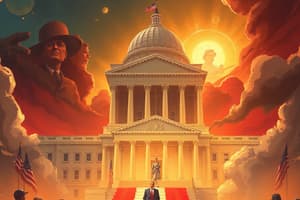Podcast
Questions and Answers
What branch of government does the President serve as the head of?
What branch of government does the President serve as the head of?
- Executive Branch (correct)
- Judicial Branch
- Administrative Branch
- Legislative Branch
Who has the power to declare war according to the Constitution?
Who has the power to declare war according to the Constitution?
- The President
- The Supreme Court
- The Senate
- The House of Representatives (correct)
What is the unique process for electing the President outlined in Article II, Section 1 of the Constitution?
What is the unique process for electing the President outlined in Article II, Section 1 of the Constitution?
- Appointment by Congress
- Appointment by the Supreme Court
- Electoral College (correct)
- Direct popular vote
Who was the youngest person to take office as President?
Who was the youngest person to take office as President?
What can the President do if they disagree with a bill passed by Congress?
What can the President do if they disagree with a bill passed by Congress?
Who has the power to interpret the Constitution and declare laws unconstitutional?
Who has the power to interpret the Constitution and declare laws unconstitutional?
What is the primary role of the President as established by Article II, Section 1 of the U.S. Constitution?
What is the primary role of the President as established by Article II, Section 1 of the U.S. Constitution?
What is the term length for a President's tenure in office?
What is the term length for a President's tenure in office?
Which of the following is NOT a power granted to the President by the Constitution?
Which of the following is NOT a power granted to the President by the Constitution?
In which area does the President hold significant power, according to the text?
In which area does the President hold significant power, according to the text?
Which statement best describes the limitations on the President's powers?
Which statement best describes the limitations on the President's powers?
Which branch of government is responsible for confirming the President's nominations for federal judges and ambassadors?
Which branch of government is responsible for confirming the President's nominations for federal judges and ambassadors?
Flashcards are hidden until you start studying
Study Notes
The Role and Responsibilities of the President
The President of the United States holds a unique position in the federal government. Article II, Section 1 of the United States Constitution establishes the Executive Branch of the national government and vests the executive power in the President. The President holds office for a term of four years and is responsible for enforcing the laws of the nation.
The role of the President includes serving as the Commander in Chief of the Army and Navy of the United States, requiring written opinions from the heads of executive departments, granting reprieves and pardons for offenses against the United States (except in cases of impeachment), negotiating and signing treaties with foreign nations (with the consent of Congress), nominating federal judges, ambassadors, and other public officials subject to Senate confirmation, and receiving ambassadors and other diplomats representing foreign nations.
Powers and Limitations
The President holds significant power, especially in terms of foreign affairs and national defense. They have the authority to receive foreign ambassadors and recognize foreign governments. In addition to these exclusive powers, the President shares powers with Congress for joint decision-making on matters such as treaty negotiation and appointment of certain types of officers.
However, the President's powers are not absolute. For example, the Supreme Court has ruled that the Constitution does not make the President a lawmaker, although his role includes the power to execute laws faithfully. Also, the power to declare war rests solely with Congress, leaving the military ventures to be authorized by Congressional resolutions, which serve as triggers for presidential action.
Election Process
The election of the President follows a unique process outlined in Article II, Section 1 of the Constitution. Each state appoints electors equal to its number of Senators and Representatives in Congress. Electors must vote for two individuals, one of whom cannot be an inhabitant of their home state. After casting votes, electors send sealed copies to the seat of government and provide the Vice President with a list of all votes, signed and certified.
Candidates need to secure a majority of the total electoral votes to win the presidency. If no candidate achieves a majority, the House of Representatives chooses the President among the top three candidates, with each state delegation having one vote. For the Vice Presidency, the candidate with the second highest number of electoral votes wins.
Historical Overview
Since the establishment of the office, the country has seen a diverse range of presidents, varying in age, background, and policies. Theodore Roosevelt, at 42 years old, was the youngest person to take office, while Joe Biden, aged 78, is the oldest president to date. Some presidents, like George Washington, established precedents and laid the groundwork for the country's future. Others, like Abraham Lincoln, led the nation through critical periods of history, such as the Civil War.
Relationship with Other Branches of Government
The President serves as head of the Executive Branch, but also interacts with the other two branches of government: Congress and the judiciary. The President works closely with Congress to enact legislation, while ensuring that laws are faithfully executed. The President can veto bills passed by Congress, which must then be overridden if they are to become law.
The relationship between the President and the Supreme Court is also significant. While the Constitution does not explicitly mention judicial review, it is generally understood that the Supreme Court has the power to interpret the Constitution and declare laws unconstitutional. In turn, the President appoints federal judges subject to Senate confirmation, which can influence the direction of legal decisions.
Studying That Suits You
Use AI to generate personalized quizzes and flashcards to suit your learning preferences.




